苏教版中考英语复习各单元要点7B U5
- 格式:doc
- 大小:56.00 KB
- 文档页数:7
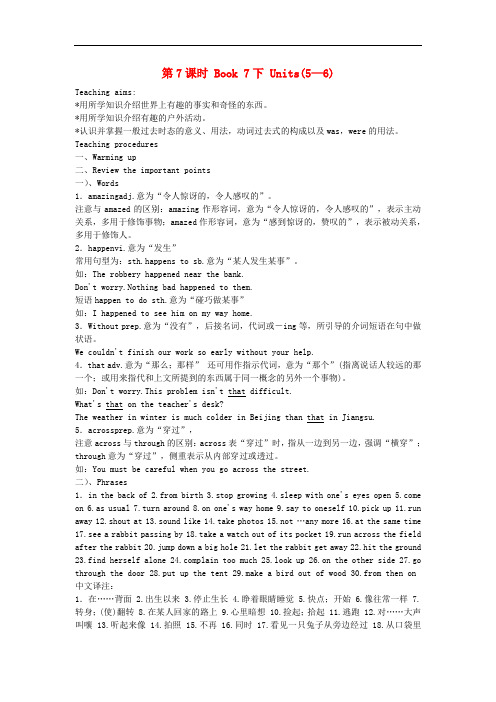
第7课时 Book 7下 Units(5—6)Teaching aims:*用所学知识介绍世界上有趣的事实和奇怪的东西。
*用所学知识介绍有趣的户外活动。
*认识并掌握一般过去时态的意义、用法,动词过去式的构成以及was,were的用法。
Teaching procedures一、Warming up二、Review the important points一)、Words1.amazingadj.意为“令人惊讶的,令人感叹的”。
注意与amazed的区别:amazing作形容词,意为“令人惊讶的,令人感叹的”,表示主动关系,多用于修饰事物;amazed作形容词,意为“感到惊讶的,赞叹的”,表示被动关系,多用于修饰人。
2.happenvi.意为“发生”常用句型为:sth.happens to sb.意为“某人发生某事”。
如:The robbery happened near the bank.Don't worry.Nothing bad happened to them.短语happen to do sth.意为“碰巧做某事”如:I happened to see him on my way home.3.Without prep.意为“没有”,后接名词,代词或-ing等,所引导的介词短语在句中做状语。
We couldn't finish our work so early without your help.4.that adv.意为“那么;那样” 还可用作指示代词,意为“那个”(指离说话人较远的那一个;或用来指代和上文所提到的东西属于同一概念的另外一个事物)。
如:Don't worry.This problem isn't that difficult.What's that on the teacher's desk?The weather in winter is much colder in Beijing than that in Jiangsu. 5.acrossprep.意为“穿过”,注意across与through的区别:across表“穿过”时,指从一边到另一边,强调“横穿”;through意为“穿过”,侧重表示从内部穿过或透过。
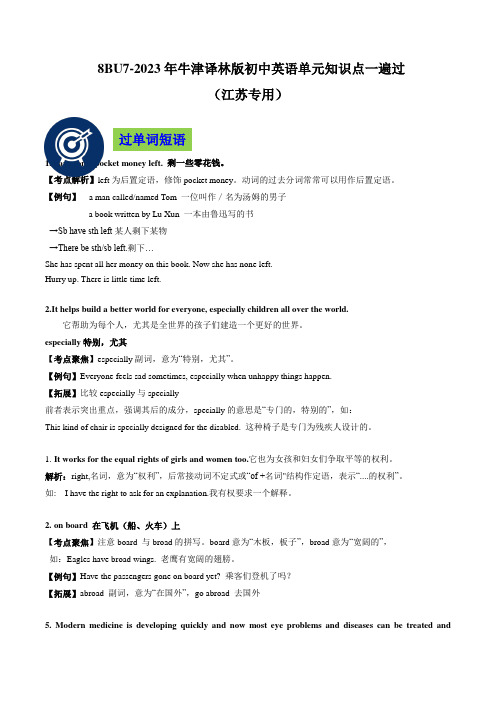
8BU7-2023年牛津译林版初中英语单元知识点一遍过(江苏专用)过单词短语1. have some pocket money left. 剩一些零花钱。
【考点解析】left为后置定语,修饰pocket money。
动词的过去分词常常可以用作后置定语。
【例句】 a man called/named Tom 一位叫作/名为汤姆的男子a book written by Lu Xun 一本由鲁迅写的书→Sb have sth left某人剩下某物→There be sth/sb left.剩下…She has spent all her money on this book. Now she has none left.Hurry up. There is little time left.2.It helps build a better world for everyone, especially children all over the world.它帮助为每个人,尤其是全世界的孩子们建造一个更好的世界。
especially特别,尤其【考点聚焦】especially副词,意为“特别,尤其”。
【例句】Everyone feels sad sometimes, especially when unhappy things happen.【拓展】比较especially与specially前者表示突出重点,强调其后的成分,specially的意思是“专门的,特别的”,如:This kind of chair is specially designed for the disabled. 这种椅子是专门为残疾人设计的。
1.It works for the equal rights of girls and women too.它也为女孩和妇女们争取平等的权利。
解析:right,名词,意为“权利”,后常接动词不定式或“of +名词"结构作定语,表示“....的权利”。
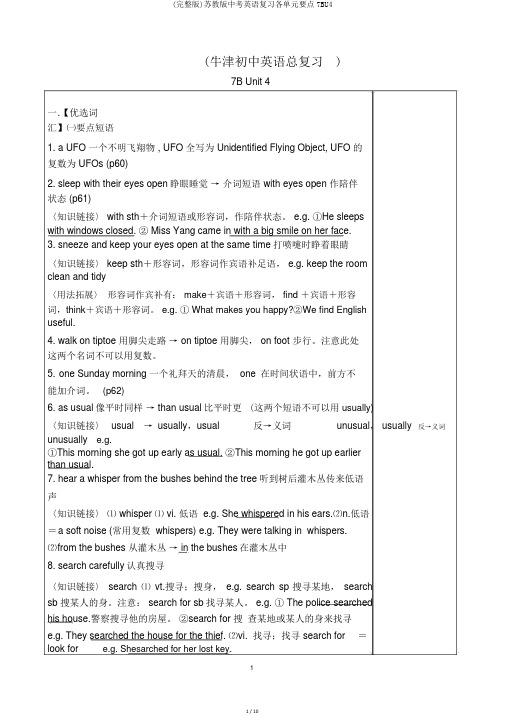
(牛津初中英语总复习 )7B Unit 4一.【优选词汇】㈠要点短语1.a UFO 一个不明飞翔物 , UFO 全写为 Unidentified Flying Object, UFO 的复数为 UFOs (p60)2.sleep with their eyes open睁眼睡觉→介词短语 with eyes open 作陪伴状态 (p61)〈知识链接〉 with sth+介词短语或形容词,作陪伴状态。
e.g. ①He sleepswith windows closed. ② Miss Yang came in with a big smile on her face.3. sneeze and keep your eyes open at the same time打喷嚏时睁着眼睛〈知识链接〉 keep sth+形容词,形容词作宾语补足语, e.g. keep the roomclean and tidy〈用法拓展〉形容词作宾补有: make+宾语+形容词, find +宾语+形容词,think+宾语+形容词。
e.g. ① What makes you happy?②We find Englishuseful.4.walk on tiptoe 用脚尖走路→ on tiptoe 用脚尖, on foot 步行。
注意此处这两个名词不可以用复数。
5.one Sunday morning 一个礼拜天的清晨, one在时间状语中,前方不能加介词。
(p62)6. as usual像平时同样→ than usual比平时更 (这两个短语不可以用usually)〈知识链接〉usual→ usually,usual反→义词unusual, usually反→义词unusually e.g.①This morning she got up early as usual. ②This morning he got up earlierthan usual.7.hear a whisper from the bushes behind the tree听到树后灌木丛传来低语声〈知识链接〉⑴ whisper ⑴ vi. 低语 e.g. She whispered in his ears.⑵n.低语=a soft noise (常用复数 whispers) e.g. They were talking in whispers.⑵f rom the bushes 从灌木丛→ in the bushes在灌木丛中8. search carefully认真搜寻〈知识链接〉search ⑴vt.搜寻;搜身,e.g. search sp搜寻某地,searchsb 搜某人的身。

最新苏教版英语七下Unit-5-8重点短词及句子Unit 5 Revision一.根据音标写单词:课后126页和127页的第四单元单词牢记(能根据音标正确写出单词)二.重点短语,句子和语法:1.一个UFO a UFO2.我昨天看见了一个。
I saw one yesterday.3.这世界充满了令人惊奇的事物。
The world is full of amazing things.4.一些不寻常的事情some unusual things注意:寻常的usual / 不寻常的unusual things5.看它的亮光look at its bright lights6.鱼是睁着眼睛睡觉的。
Fish sleep with their eyes open.我们的眼睛的大小和出生时候是一样的。
Our eyes are the same size from birth. 注意:same 前面the 不可省略7.太阳大约比地球大130万倍。
The Sun is about 1,300,000 times larger than the Earth.注意:larger 是large 的比较级。
8.在大象的脚后跟没有骨头,只有脂肪。
There are no bones in the back of elephants’ feet-only fat.9.我们的鼻子和耳朵从不停止生长。
Our nose and ears never stop growing.停下正在做的事情stop doing停下来去做某事stop to do10.趣闻fun facts11.一些奇怪的事情something strange注意:不定代词something/nothing/anything/everything/everyone/someone 后面动词用三单形式;形容词在它们的后面比如:某人在这儿。
Someone is here.12.像往常一样,他们坐在一棵大树下。
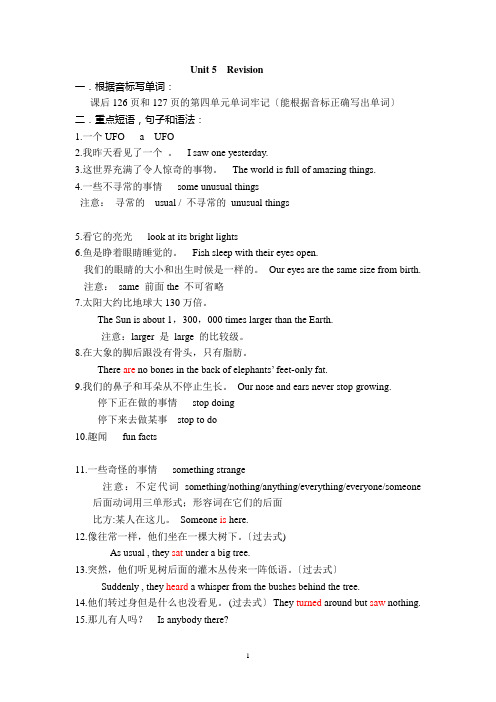
Unit 5 Revision一.根据音标写单词:课后126页和127页的第四单元单词牢记〔能根据音标正确写出单词〕二.重点短语,句子和语法:1.一个UFO a UFO2.我昨天看见了一个。
I saw one yesterday.3.这世界充满了令人惊奇的事物。
The world is full of amazing things.4.一些不寻常的事情some unusual things注意:寻常的usual / 不寻常的unusual things5.看它的亮光look at its bright lights6.鱼是睁着眼睛睡觉的。
Fish sleep with their eyes open.我们的眼睛的大小和出生时候是一样的。
Our eyes are the same size from birth. 注意:same 前面the 不可省略7.太阳大约比地球大130万倍。
The Sun is about 1,300,000 times larger than the Earth.注意:larger 是large 的比较级。
8.在大象的脚后跟没有骨头,只有脂肪。
There are no bones in the back of elephants’ feet-only fat.9.我们的鼻子和耳朵从不停止生长。
Our nose and ears never stop growing.停下正在做的事情stop doing停下来去做某事stop to do10.趣闻fun facts11.一些奇怪的事情something strange注意:不定代词something/nothing/anything/everything/everyone/someone 后面动词用三单形式;形容词在它们的后面比方:某人在这儿。
Someone is here.12.像往常一样,他们坐在一棵大树下。
〔过去式)As usual , they sat under a big tree.13.突然,他们听见树后面的灌木丛传来一阵低语。
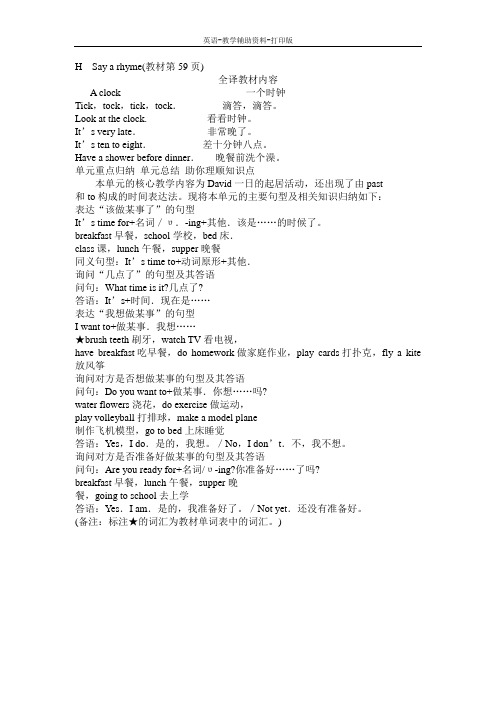
英语-教学辅助资料-打印版H Say a rhyme(教材第59页)全译教材内容A clock 一个时钟Tick,tock,tick,tock.滴答,滴答。
Look at the clock. 看看时钟。
It’s very late.非常晚了。
It’s ten to eight.差十分钟八点。
Have a shower before dinner.晚餐前洗个澡。
单元重点归纳单元总结助你理顺知识点本单元的核心教学内容为David一日的起居活动,还出现了由past和to构成的时间表达法。
现将本单元的主要句型及相关知识归纳如下:表达“该做某事了”的句型It’s time for+名词/υ.-ing+其他.该是……的时候了。
breakfast早餐,school学校,bed床.class课,lunch午餐,supper晚餐同义句型:It’s time to+动词原形+其他.询问“几点了”的句型及其答语问句:What time is it?几点了?答语:It’s+时间.现在是……表达“我想做某事”的句型I want to+做某事.我想……★brush teeth刷牙,watch TV看电视,have breakfast吃早餐,do homework做家庭作业,play cards打扑克,fly a kite 放风筝询问对方是否想做某事的句型及其答语问句:Do you want to+做某事.你想……吗?water flowers浇花,do exercise做运动,play volleyball打排球,make a model plane制作飞机模型,go to bed上床睡觉答语:Yes,I do.是的,我想。
/No,I don’t.不,我不想。
询问对方是否准备好做某事的句型及其答语问句:Are you ready for+名词/υ-ing?你准备好……了吗?breakfast早餐,lunch午餐,supper晚餐,going to school去上学答语:Yes.I am.是的,我准备好了。
苏教版中考英语复习各单元要点7B_U3(牛津初中英语总复习)7B Unit 3一.【精选词汇】㈠重点短语1. follow me=come with me跟我来(p42)〈知识链接〉follow vt.跟随→following adj.接着的e.g. the following day第二天〈用法拓展〉follow sb’s advice采纳某人的建议e.g. follow the doctor’s advice遵从医嘱2. don’t be afraid别怕→be afraid of=be frightened of害怕…〈知识链接〉⑴I’m afraid (that)…恐怕…。
担心某事可能要发生或表示客气的回答。
e.g.①I’m afraid that I’ll be late.恐怕我要迟到。
②I’m afraid he is not in.对不起他不在。
⑵be afraid of sb/sth害怕某人或某物,be afraid of doing sth 担心或害怕某事,be afraid to do sth(由于胆小)不敢做某事e.g.①Are you afraid of snakes?②He was afraid to walk across the one-logged bridge because he was afraid of falling into the river.因为他担心会掉进河里,他不敢过那个独木桥。
3. three men in police uniform三个穿警服的人→介词短语in…作后置定语。
(p44)4. get into…进入…→反义词:get out of…走出…5. at once=right away=immediately立刻;马上,push…into…把…推进…6. report to a policeman → report sth to sb向某人汇报某事7. run away from Hill Building→run away from…逃离某地8. stop taking notes停止做笔录→stop doing停止做(意思是不做), stop to do 停下来去做(做)〈知识链接〉⑴We’re too tired. Let’s stop to take a rest.⑵Stop talking. The teacher is coming.9. laugh happily高兴地笑了,ask them about that →ask sb about sth询问某人有关某事10. open the back door of the van with his knife=use his knife to open the back door of the van〈知识链接〉use sth to do sth=do sth with sth用某物做某事e.g.He climbed up the house with a ladder.=He used a ladder to climb up the house.11. have a barbecue吃烧烤,have a picnic野餐(p55)12. most students大多数学生, most+名词复数, most of the+名词复数或most of us/you/them㈡词汇解析1. push推=use your hands to make something move forward,注意pull的意思是“拉”。
苏教版英语5B unit 7 默写纸 Melody精英课堂 1 复习课 1. 一年四季: 季节 月份全拼 月份缩写 春( ) 三月 四月 五月 夏( ) 六月 七月 八月 秋( ) 九月 十月 十一月 冬( ) 十二月 一月 二月 注意:在某一个季节,和在某一个月所用介词一样,都是“in”且中间不加定冠词“the” 季节首字母不需要大写,但是月份首字母要大写 in spring; in May
2. 上节课发现有同学一周七天的拼写有点遗忘了,一起复习一下: 周一 周二 周三 周四 周五 周六 周日 注意:在星期几介词用的是“on”, 中间加定冠词“the”, 但是首字母要大写。 on Sunday...
3. 上节课我们一起学习了几个节日,看图分辨一下分别是什么节,并在图下标出对应的英文名字。
4. 以下表格是本课重点短语和表达方式,看看大家回去有没有复习。 苏教版英语5B unit 7 默写纸 Melody精英课堂 2 测试题笔试部分(70分) 一、英汉互译。(10分) 1.在五月 2.give presents 3.在父亲节 4. in January or February 5.做一张卡片 6.some beautiful flowers 7.赏月 8.climb mountains 9.吃月饼 10.on the second Sunday of May 二、根据中文或首字母提示填空。(5分) 1.The Mid-Autumn Festival is in S or O . 2.—Do you like (饺子)? —Yes, I do. 3.Look at the m . It’s so bright. 4.4.It’s on the (第三) of January. 5.The Double Ninth Festival is for o people. 6.I often v my grandparents when I am free. 7.What do (人们) on Mother’s Day? 8. Festival(春节)is also called Chinese New Year. 9.M comes before April. 三、单项选择。(20分) ( )1、______spring, it’s warm and sunny. A. In B. At C. On
1 (牛津初中英语总复习) 7B Unit 5 一.【精选词汇】 ㈠重点短语 1. be careful=take care=look out当心;小心 (p76) 2. clean up the park打扫公园,give a seat to someone on the bus在公交车上给人让座,collect things for Project Hope为希望工程筹集物资,visit a home for the elderly参观老年之家 3. help his neighbour out of a fire帮助他的邻居从火灾中出来→help sb out of…帮助某人脱离... 4. be at home alone独自在家,see a lot of smoke from next door看到隔壁冒浓烟 (p78) 5. the 79-year-old Mrs Sun 79岁的孙太太,注意此处不能用a/an代替定冠词the。 〈知识链接〉基数词-名词单数-形容词,作定语修饰名词,如:an eleven-year-old boy 6. pour water over his jacket向他的茄克上倒水→pour…over…向…上倒…;把…倒在…上 〈知识链接〉pour ⑴vt.倾倒Don’t pour waste water into the river. ⑵vt.倒 pour sb sth=pour sth for sb 给某人倒…e.g. I’ve poured you a cup of tea.=I’ve poured a cup of tea for you.我给你倒了一杯茶。⑶vi.下大雨It’s pouring outside.外面下着瓢泼大雨。 7. be in hospital for two months住院两个月→be/stay in hospital住院, be in the hospital在医院里 8. keep long hair away from fire让长发远离火→keep…away from…让…远离… (p80) 〈知识链接〉Something must be done to keep children away from Internet bars. 必须采取措施让孩子远离网吧。 9. recommend Daniel for the Most Helpful Student Award推荐丹尼尔为最助人为乐学生奖得主 〈知识链接〉⑴recommend sb for sth推荐某人获得… e.g. She was recommended for the award by the audience. ⑵recommend sb as…推荐某人为… e.g. We recommended David as the new chairperson of the Students’ Union. ⑶recommend sb/sth to sb向某人推荐某人或某物 e.g. He recommended the new book to his friends. 10. always think of others first总是先想到别人→ think of…想到,想起 (p81) 〈知识链接〉He always thinks more of others than himself.他总是为别人着想。 11. do a lot of computer work for the club为俱乐部做许多计算机方面的工作,play water sports进行水上运动,fall down摔倒,run up跑上前,have/get the award获奖 12. be grateful for sth对某事感激 (注意grateful常被误写为greatful) 〈知识链接〉grateful=thankful感激的,可作定语或表语。The thankful mother thanked him. 2
13. row a boat=go rowing划船→go+v-ing去做某事 (p82) 14. forget to bring a football →forget to do sth忘记要做某事, forget doing sth忘记做过某事(p84) 〈知识链接〉don’t forget/remember to do sth记住要做某事, remember doing sth记得做过某事。请做题: ①I’ll never forget (hear) this piece of music for the first time. ②I wanted to call her, but I forgot (ask) her for her phone number. ③—Why didn’t you go to Amy’s birthday party? —Oh, sorry, I (forget). 〈用法拓展〉⑴forgetful adj.健忘的 ⑵forgettable adj.易被忘记的→unforgettable adj.难忘的 15. have a good memory记性好→have a bad memory记性差,be good at writing写作好;擅长写作→be good at…→be weak at…,this term这学期→last term上学期,read English and use English more often多读、多用英语,know a lot about Chinese history对中国历史了解许多,do/try one’s best (to do sth)尽力(做某事),have good grades in…在某方面取得好成绩,get better results in…在某方面取得更好的成绩,jump high跳得高,get into the school team进入校队,That’s OK.没关系;不用谢。Never mind.不要紧;没关系。No problem.没问题。(p86-p87) 16. parents’ meeting家长会→have a parents’ meeting开家长会,注意parents’使用复数的所有格。 17. do more exercises多做习题,listen and speak more多听、多说,repeat after the teacher跟老师读,need more practice需要多练习,work out some outlines first先列出一些提纲 (p88) 18. tell their differences说出它们的区别→different不同的→difference不同;差异→differences 〈知识链接〉Please find out the differences between the two pictures.请找出这两幅画的差异。 〈用法拓展〉tell vt.区分→tell A from B,“区分A和B”,e.g. I can’t tell the sheep from the goat. 19. get/have an award获奖,yours faithfully你忠实的=yours sincerely你真诚的(用于书信结尾) 20. look forward to hearing from you soon →look forward to sth/doing sth期待某事/做某事 〈知识链接〉hear from sb=receive/get a letter from sb=receive sb’s letter收到某人的信 ㈡词汇解析 1. able →ability →abilities →have the ability to do sth有做某事的能力 e.g. ①People have different abilities. ②He is a man of ability.他是一个能干的人。 2. alone=by oneself=on one’s own单独;独自 3. host男主持→hostess女主持人→airhostess空姐,类似的有waiter →waitress,actor →actress 4. 写出下列形容词的反义词:①helpful ②brave ③kind ④careful ⑤polite ⑥grateful ⑦quick 3
⑧happy 5. “推荐信”的格式:receiver收信人,sender寄信人。⑴书信的右上角:address of sender寄信人的地址 ⑵左上角:①date(写信日期) ②title of receiver收信人的头衔③address of receiver收信人的地址④greeting称呼⑤subject主题⑶message正文⑷closing结束语⑸①signature of sender寄信人签名②name of sender寄信人的姓名③title of sender寄信人的头衔 6. likely adj.可能的 表示有发生的可能性,常用于①Sb be likely to do sth.某人可能做某事②It is likely that sb will do sth.可能某人将做某事。 e.g. ①She is likely to succeed. =It is likely that she will succeed. 她可能会成功。②It is likely to rain.似乎要下雨了。 二.【重点句型】 1. Then he rushed into Mrs Sun’s kitchen to save her. There was a lot of smoke and the fire was very hot. 他冲进 孙 太太的厨房去救她。动词不定式短语to save her表目的。 (p78) 2. He put out the fire with a blanket and helped Mrs Sun out. 注意该句中put和helped的时态。 〈知识链接〉put out the fire灭火,put …out扑灭,属于“动词+副词”,以下也是动词+副词结构。 〈用法拓展〉⑴put up ①张贴→put up a poster贴海报②举起put up your hands举手⑵put away,e.g. put it/them away ⑶put off推迟;拖延 ⑷put on穿上 ⑸put down放下 ⑹put in…插入, put in the CD ⑺put…into…把…放入/投入…中,e.g. ①Do not put anything hot into the rubbish bin. ②Hepburn had put most of her effort into ballet training before she entered the film industry. 3. Many people visited him and brought him flowers and presents. →bring带来,bring sb sth=bring sth to sb 4. It’s important to be careful with fire.小心用火十分重要。 〈知识链接〉⑴be careful with/of/about…小心;注意;谨慎 e.g. ①Be careful with the traffic. 小心车辆。②Be careful with matches.小心使用火柴。 ⑵be careful (not) to do sth必须注意(不)做某事,e.g. Be careful not to be late. ⑶careful→careless, careful→carefully, careless→carelessly, careless→carelessness n.粗心 ⑷careful/carefully→more careful/carefully, careless/carelessly→more careless/carelessly 5. Thank you for joining us this evening, Zhanghua.谢谢你今晚参加我们的节目。 (p79) 6. Did you do anything to keep yourself safe?你采取措施保护自己安全了吗? 〈知识链接〉⑴do something to do sth采取措施做某事→sth must be done to do sth必须采取措施做某事 ⑵keep+宾语+形容词,形容词作宾补。e.g. keep the classroom clean保持教室清洁 7. First, he heard his neighbour, Mrs Sun, calling for help.首先他听到他的邻居孙太太呼救。(p80) 〈知识链接〉⑴hear sb doing sth听到某人在做某事 e.g. She heard someone